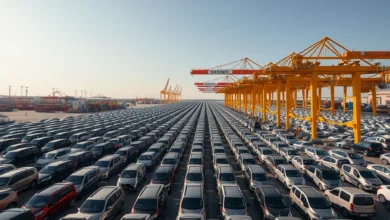
London’s Divorce Capital Status: One Year Post Potanin v Potanina
The landmark Potanin v Potanina case, worth £5 billion, changed how London handles high-value international divorces. This groundbreaking ruling transformed the way English courts deal with divorce cases that involve wealthy international couples.
Legal professionals and international clients now question London’s status as the world’s divorce capital, a year after this pivotal decision. The Supreme Court’s judgment has altered the map for permission applications, jurisdiction approaches, and practical requirements in English courts’ international divorce cases.
The lasting effects of Potanin v Potanina continue to shape London’s divorce landscape. These changes signal a new direction for international divorce proceedings in England and Wales, and their significance extends beyond the immediate ruling.
The Landmark Potanin v Potanina Ruling
The Supreme Court’s split 3-2 decision in Potanin v Potanina sent shockwaves through international divorce law. This groundbreaking case with USD 20 billion in assets challenged London’s traditional approach to international divorce cases fundamentally.
Key elements of the Supreme Court decision
Lord Leggatt’s majority judgment established a vital principle of procedural fairness. Both parties must get a chance to present their case before judges make decisions. This approach radically altered previous practices, especially when courts handle permission applications for financial relief after overseas divorces.
Changes to permission application procedures
The ruling brought several key changes to the permission application process:
- Respondents no longer face the “knockout blow” requirement
- Respondents now have an “absolute and unfettered right” to challenge permission grants
- Applicants must prove a “real prospect of success” instead of just showing their claim isn’t without merit
Impact on international divorce cases
English courts have altered their approach to international divorce cases completely. The Supreme Court made it clear that permission grants now need more than just proving “the claim is not totally without merit or abusive”. This stronger standard creates a more balanced approach to international divorce proceedings that might affect London’s status as the world’s divorce capital.
Cases with existing overseas financial orders need stronger evidence of substantial grounds before allowing additional claims in England. This new approach marks a dramatic change from previous practices that courts applied without criticism for over a decade.
Practical Changes in Legal Practice
The Potanin ruling has transformed legal procedures and timelines for international divorce cases. Lawyers and clients must now direct themselves through a changed English divorce system.
New procedural requirements for lawyers
Lawyers need to meet stricter requirements when applying for permission in international cases. Courts now mandate a 20-week waiting period between starting proceedings and applying for conditional order. This “cooling-off” period has altered how international divorce cases move forward. Legal teams must adapt their case management strategies.
Timeline changes in international cases
International divorce proceedings take much longer now. Divorce applications need 3-4 weeks for the court to issue them. The Conditional Order stage takes another 8-9 weeks to process. The whole divorce process stretches to about 40 weeks (9.2 months). This marks a big increase from earlier timelines.
Cost implications for litigants
The new system has made financial planning more complex. The court charges £593 as a simple filing fee. However, the total costs can rise quickly:
- A straightforward divorce costs £600 plus VAT and court fees
- Complex international cases might reach £50,000 or more
- Mediators charge between £200-£400 per hour
Cases with foreign assets need more money due to complex valuations and jurisdiction issues. Extended legal support under new procedures often leads to higher overall costs for people seeking divorce in English courts.
Impact on International Divorce Cases
Brexit and the Potanin ruling have altered the map of international divorce proceedings dramatically. Courts now handle international divorces with revised criteria, especially when you have cases with EU member states.
Changes in jurisdiction approach
English courts have adopted new grounds for divorce applications. The specific requirements include:
- Both parties being habitually resident in England and Wales
- The respondent’s habitual residence in England and Wales
- The applicant’s habitual residence with one year’s residence requirement
Effect on pending cases
The previous ‘first to file’ rule no longer automatically applies between UK and EU jurisdictions for cases started after January 2021. Courts must now evaluate multiple factors. These include each party’s connections to the jurisdiction and where matrimonial assets are located.
International recognition considerations
Recognition of English divorces has become more complex, especially with EU member states. Only 12 of 27 EU member states have signed the Hague Convention 1970. This creates potential recognition challenges in countries like France, Ireland, and Spain. Legal practitioners must carefully evaluate recognition requirements before moving forward with cross-border cases.
Part III jurisdiction remains particularly significant since the Law Commission confirmed it won’t review Part III applications in its divorce financial provision review. This affects international couples significantly, especially those labeled “divorce tourists” who face stricter scrutiny of their claims. Permission tests and procedural requirements have become stronger to create a more balanced approach. Legal experts still debate whether these changes will limit divorce tourism effectively.
Future of London’s Divorce Capital Status
London’s reputation as the world’s divorce capital faces new challenges after the Potanin case. The way lawyers handle international divorce cases has changed dramatically.
Current international perception
Brexit changed how attractive London is to wealthy international couples who want to divorce. Lawyers say English court decisions now face major hurdles when enforced abroad, especially when you have foreign assets. Many couples think twice about choosing London as their divorce destination because of this uncertainty.
Competition from other jurisdictions
“Forum shopping” remains common as spouses look for the best place to file their divorce. Several key factors now affect their choice:
- Recognition challenges in EU member states
- More hurdles for permission applications
- Higher costs linked to early legal battles
- Longer waiting times for international cases
Long-term implications for the legal sector
The legal world shows clear signs of change. Forum disputes between English and EU courts happen more often. Cases take longer and cost more money. The Supreme Court made the permission rules clearer, but this might lead to more court battles.
London might keep its status as the divorce capital if courts can balance their generous approach with new rules. English law still helps the financially weaker spouse, but Brexit makes it harder to enforce decisions abroad. This could affect how international couples choose where to divorce.
London’s role as the world’s divorce capital faces a turning point one year after the Potanin v Potanina ruling. The Supreme Court has set stricter standards for international divorce cases. This 12-month old decision has created a more balanced yet intricate legal landscape. Brexit-related challenges have altered the map of how English courts handle high-value international divorces.
Legal professionals now face longer timelines, bigger costs, and tougher procedural requirements. There’s another reason why international couples might think twice about choosing English courts – recognition issues in EU jurisdictions make divorce proceedings more complicated.
English courts still enjoy their reputation for fairness and protecting financially weaker parties. But real-life challenges in enforcement and recognition could shape how couples choose their jurisdiction. London’s future as a divorce capital depends on how well its legal system can balance its traditionally generous approach with new safeguards while tackling post-Brexit hurdles in international cases.






